Cerbera inflata
Cerbera inflata, commonly known as the cassowary plum, grey milkwood, Joojooga, or rubber tree, is a plant in the family Apocynaceae endemic to north east Queensland, specifically the Atherton Tablelands and adjacent areas.
| Cassowary plum | |
|---|---|
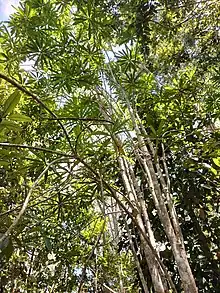 | |
| Scientific classification | |
| Kingdom: | Plantae |
| Clade: | Tracheophytes |
| Clade: | Angiosperms |
| Clade: | Eudicots |
| Clade: | Asterids |
| Order: | Gentianales |
| Family: | Apocynaceae |
| Genus: | Cerbera |
| Species: | C. inflata |
| Binomial name | |
| Cerbera inflata | |
| Synonyms[3] | |
| |
Description
The cassowary plum is a tree up to 30 m (98 ft) in height with a grey fissured trunk. Leaves are glabrous (smooth), lanceolate, dull green above and paler below, and crowded towards the end of the twigs. They measure from 10 to 26 cm (3.9 to 10.2 in) long and 1.5 to 3 cm (0.59 to 1.18 in) wide with 33 to 37 lateral veins. All parts of the tree produces a copious milky sap when cut.[4][5][6]
The inflorescence is a much branched cyme up to 15 cm (5.9 in) with usually more than 50 flowers. The flowers have 5 white sepals, a long corolla tube about 16 mm (0.63 in) in length by 2 millimetres (0.079 in) wide with 5 free lobes at the end. They are white with a cream or green centre, are about 10 to 15 mm (0.39 to 0.59 in) in diameter, and have a sweet scent.[4][5][6]
Fruits are a bright blue/purple drupe measuring about 7 cm (2.8 in) long by 3 cm (1.2 in) wide, slightly pointed and the end away from the pedicel (stem), with a single large seed.[4][5][6]
Taxonomy
The species was first described by S. T. Blake in 1948 in the Proceedings of the Royal Society of Queensland as Cerbera dilatata.[7] That name was subsequently found to be a nomen illegitimum as it had already been applied to another plant in 1927[8] and so it was renamed C. inflata in 1959.[5]
Etymology
The species epithet derives from the Latin inflatus, meaning "inflated" and referring to the corolla tube.[6]
Notes on taxa
There is potential confusion regarding the taxon C. dilatata. To clarify, C. dilatata Markgr. was first described in 1927, but has since been determined to be a synonym of C. odollam Gaertn..[8] C. inflata was originally named C. dilatata S. T. Blake but was renamed in 1959 due to the earlier usage.[5] Of these three taxa, only C. odollam and C. inflata are now considered legitimate, however there are still many references and sightings labelled with Cerbera dilatata, and any that occur outside Australia are likely to be Cerbera odollam.
Distribution and habitat
Cerbera inflata is endemic to Queensland. It grows in well developed rainforest in the foothills and uplands from Innisfail to the Atherton Tablelands. The altitudinal range is from 100 to 800 m (330 to 2,620 ft).[4][6]
Ecology
Cassowaries eat the fallen fruit whole, and are the major dispersal agent for the species.[6]
Gallery
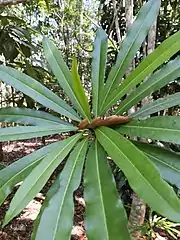 Spirally arranged leaves
Spirally arranged leaves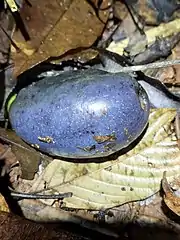 Fruit
Fruit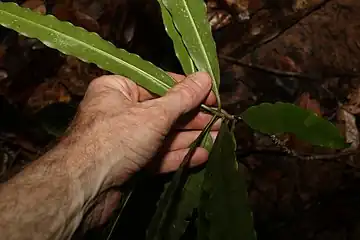

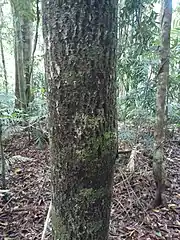 Trunk
Trunk
References
- "Species Profile - Cerbera inflata". Queensland Government. Retrieved 6 February 2021.
- "Cerbera inflata". International Plant Names Index. Retrieved 6 February 2021.
- "Cerbera inflata". Australian Plant Census (APC). Retrieved 6 February 2021.
- F.A. Zich; B.P.M Hyland; T. Whiffen; R.A. Kerrigan. "Cerbera inflata". Australian Tropical Rainforest Plants, Edition 8. Centre for Plant Biodiversity Research, Australian Government. Retrieved 14 February 2021.
- Forster, Paul I. (1992). "A Taxonomic Revision of Cerbera L. (Apocynaceae) in Australia and Papuasia". Austrobaileya. Austrobaileya, vol. 3, no. 4, 1992, pp. 569–579. 3 (4): 569–579. doi:10.5962/p.365989. JSTOR 41738802. S2CID 260401807. Retrieved 14 February 2021.
- Cooper, Wendy; Cooper, William (2004). Fruits of the Australian Tropical Rainforest. Nokomis Editions. p. 35. ISBN 0-9581742-1-0.
- Blake, S. T. (1948). "STUDIES IN AUSTRALIAN APOCYNACEAE AND ASCLEPIADACEAE, I." Proceedings of the Royal Society of Queensland. 59 (2): 161. doi:10.5962/p.351729. S2CID 257131991. Retrieved 14 February 2021.
- "Cerbera dilatata". International Plant Names Index (IPNI). Royal Botanic Gardens, Kew; Harvard University Herbaria & Libraries; Australian National Botanic Gardens. Retrieved 14 February 2021.
External links
 Data related to Cerbera inflata at Wikispecies
Data related to Cerbera inflata at Wikispecies Media related to Cerbera inflata at Wikimedia Commons
Media related to Cerbera inflata at Wikimedia Commons- View a map of historical sightings of this species at the Australasian Virtual Herbarium
- View observations of this species on iNaturalist
- View images of this species on Flickriver